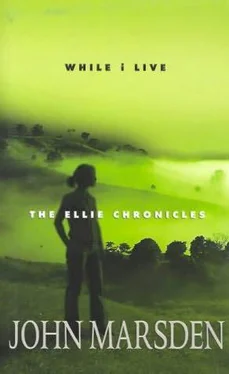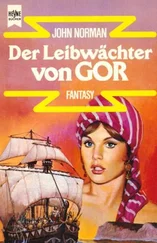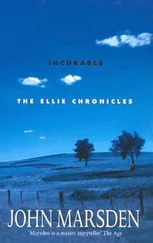John Marsden - While I live
Здесь есть возможность читать онлайн «John Marsden - While I live» весь текст электронной книги совершенно бесплатно (целиком полную версию без сокращений). В некоторых случаях можно слушать аудио, скачать через торрент в формате fb2 и присутствует краткое содержание. Жанр: Фантастика и фэнтези, на английском языке. Описание произведения, (предисловие) а так же отзывы посетителей доступны на портале библиотеки ЛибКат.
- Название:While I live
- Автор:
- Жанр:
- Год:неизвестен
- ISBN:нет данных
- Рейтинг книги:4 / 5. Голосов: 1
-
Избранное:Добавить в избранное
- Отзывы:
-
Ваша оценка:
- 80
- 1
- 2
- 3
- 4
- 5
While I live: краткое содержание, описание и аннотация
Предлагаем к чтению аннотацию, описание, краткое содержание или предисловие (зависит от того, что написал сам автор книги «While I live»). Если вы не нашли необходимую информацию о книге — напишите в комментариях, мы постараемся отыскать её.
While I live — читать онлайн бесплатно полную книгу (весь текст) целиком
Ниже представлен текст книги, разбитый по страницам. Система сохранения места последней прочитанной страницы, позволяет с удобством читать онлайн бесплатно книгу «While I live», без необходимости каждый раз заново искать на чём Вы остановились. Поставьте закладку, и сможете в любой момент перейти на страницу, на которой закончили чтение.
Интервал:
Закладка:
I got ready for the funeral myself. I wore my hair out, the way my mother liked it.
Homer arrived at half past ten. When I saw him from the kitchen window, walking towards the door, and realised that he had dressed up in clothes I’d never seen him wear before, a navy suit with a dark red tie and polished black leather shoes, I felt like I’d swallowed a small apple and it had stuck halfway down my throat. It wasn’t just that he looked so handsome. It was the fact that he had put on clothes that I knew he would have hated. And there was also my awareness that in the last few days someone had been looking after the property, feeding the chooks and putting them to bed, checking the cattle, fuelling the vehicles and filling the woodbox, and I knew for sure who that someone was.
I felt a surge of love for my older ‘brother’ Homer and my little ‘brother’ Gavin. I’d practically grown up with Homer and I’d known Gavin for a lot less than a year but I could almost see the links between us at that moment.
We got in the car and off we went. I was so sick at the thought of what was in front of me. I didn’t know if I could get through it. When I saw the crowd at the church I felt even worse. ‘Don’t these people have homes of their own to go to?’ I muttered to Homer. It was a standard joke we’d been swapping for years. He squeezed my hand.
‘What do you want to do? Sit here for a while?’
I had my head down. I couldn’t look up. ‘I guess not. I guess I’d better face it.’
‘Hey, you’ve been through some tough spots. Remember the airfield? The prison? And the prison camp? You can do this.’
‘This is worse.’
He didn’t say anything. I waited a few more minutes, then, before it became impossible, got out, grabbed Gavin’s hand, and in we went.
We got through it.
It was another, I don’t know, a week I suppose before I started to function in any way again. I felt sort of guilty waking up at all, as though it was disrespectful to my parents, as though I should mourn them forever. Anything short of that and I wasn’t a good daughter. If I smiled or noticed a song on the radio or took an interest in a programme Gavin was watching on TV I felt ashamed. If I didn’t think about them every moment of every day, if I didn’t keep their memories alive by the power of my heart and mind, then I was disloyal. And worse than that, they’d go, they’d disappear into oblivion, and they’d be truly dead then. I was the only thing, the only person, standing between them and extinction.
I seem to be quoting a lot of poems here, but what the hell, here goes with another one. Mr Kassar gave it to us in Drama one day, back a couple of years. We had to prepare a Drama presentation based around it. At first we didn’t even understand it but when he explained that it was about memory and the way when someone dies a lot of their experiences and stories and personal memories die with them, suddenly I got it.
It was called ‘The Old Man’s Dead, the Baby’s Dead’. When the old man died there was no-one left to remember the little baby he and his wife gave birth to sixty or so years ago. So it’s like now the baby’s really gone. When he died and went to earth,
All the thousand million memories he’d had since birth
Went with him. The comet over Kakadu,
The buttercup he waved for love in playground games,
The Army Hall that fell in flames
And the baby who drew a dozen breaths and died.
No-one left now to read the words ‘Always remembered’,
In faded brown on the granite slab.
Good-bye old man! A lot went with you.
And only now can it be said
The old man’s dead, the baby’s dead.
I knew some of my parents’ stories. My father’s were all about farm life. The swaggies and Indian hawkers who called in to the property when Dad was a little kid. The silence in the shearing shed as the men sheared the stud rams with blades instead of electric shears, to avoid injuring them. The weekend rabbit drives, when the trappers gradually pushed the rabbits into nets in a corner of a paddock, getting over two thousand rabbits in a weekend. Drenching the sheep with bluestone-nicotine, and going out the next morning to see hundreds of huge white tapeworms all over the ground. The glut of cattle which led to well-bred Poll Hereford cows in good condition selling for ten, twenty, fifty cents each. And the fires and the floods. Always the fires and floods.
My mother’s stories ranged a bit wider. Some were about growing up in the city, some were about her trip overseas when she was eighteen. And some were about life with Dad on the farm. Her father was an accountant and her mother did a few different things, including catering and landscape design and radio production. And raising a daughter.
So my mother’s stories were about going to a private school where some girls were driven by chauffeurs each day, where Mum got caught putting a bra on a statue of the school’s first principal (who to make things worse was a guy), where she saw a teacher get run over by a drunk on a bicycle. And later, after she’d left school, helping her mother design a garden for Monica Duran, who insisted on having a huge photo of herself on a courtyard wall, going to a dance and finding a girl dead in one of the toilet cubicles, seeing the pandas in the Washington Zoo, and a soccer riot in Barcelona.
And, later, the fires and the floods.
I really believe that our stories make us who we are. I don’t think people are born as empty shells. They already have the makings of a personality and they have intelligence. But from the moment they’re born, and maybe before that, they start accumulating stories and it’s those stories that have the biggest effect on them.
Like the poem says, a thousand million memories. A thousand million stories. And then some.
I feel that in my short life I’ve already gone over the thousand million mark. Sometimes I have trouble believing that I’ve seen and done so much.
A week after the funeral Fi walked in through the kitchen door. I was at the table trying to show Gavin how to separate eggs, and I hadn’t heard her coming. Gavin certainly hadn’t heard her coming. He dropped the egg, shell and all, into the bowl with the whites and rushed to her like he’d been a calf on one side of the fence and she was his mum who’d been bellowing for him on the other side. Not that I’ve ever seen anyone less like a cow than Fi. She’s more deer, more antelope, more your young wallaby, the most naturally graceful person I know.
Gavin hugged her and hugged her. It was hard for me to get near her. I actually felt jealous of Gavin, no, not jealous, envious. Somehow I was getting too old for the Total, Give It Everything You’ve Got, No Holds Barred hugs. They were the best hugs of all. But when I was finally allowed access to Fi we held each other for a long time. She felt very warm.
Soon enough I got her a cup of coffee and we sat down at the table, Gavin squished up next to Fi on the same chair, holding his glass of cordial. (Another pang as I got the bottle of cordial from the pantry — Mum had made it less than two months ago and it had her own label on it, with a little sketch of fruit, and the words ‘Linton’s Lemon and Orange’ in cute printing.)
‘How have you been?’ she asked me.
‘OK.’
‘You looked terrible at the funeral.’
‘Were you at the funeral?’
‘You mean you don’t remember?’
‘No. I didn’t think you were there. I was a bit hurt about it actually.’
‘Oh my God, Ellie, we had a conversation, but you seemed so switched off that I didn’t know if you wanted me to stay away or what. So I thought I’d wait a bit, until the first rush of visitors had finished. ’Cos Mum said that you’d be overwhelmed by them at first and the true friends are the ones who are still around when the others have gone back to their normal daily lives.’
Читать дальшеИнтервал:
Закладка:
Похожие книги на «While I live»
Представляем Вашему вниманию похожие книги на «While I live» списком для выбора. Мы отобрали схожую по названию и смыслу литературу в надежде предоставить читателям больше вариантов отыскать новые, интересные, ещё непрочитанные произведения.
Обсуждение, отзывы о книге «While I live» и просто собственные мнения читателей. Оставьте ваши комментарии, напишите, что Вы думаете о произведении, его смысле или главных героях. Укажите что конкретно понравилось, а что нет, и почему Вы так считаете.












![William Frith - John Leech, His Life and Work, Vol. 2 [of 2]](/books/748201/william-frith-john-leech-his-life-and-work-vol-thumb.webp)